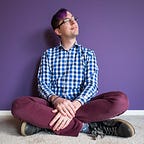Stuck In The In-Betweens of Queerness
I find myself reflecting on my queerness tonight. It’s certainly not an unusual topic; I think almost every other queer person I know contemplates about their queerness a lot.
I sit in a strange spot. I’m older than the majority of queer folks I know. It’s not that I’m particularly old, I’m 35. And it’s not that younger people are more likely to be queer. Instead, queer people who are younger are more likely to be out. Regardless, my story is starting to feel more and more unique as time marches on.
I’m not a Millennial, according to most definitions. I’m technically Gen X according to those definitions, although I don’t feel like I relate that much more to Gen X than to the Millennial generation. I suppose that doesn’t particularly matter.
What matters is that I grew up in an era and in a place where coming out as queer meant disownment for many people, and violence for more than a few of them.
I didn’t come out when I was young. That would wait until I was in my 30s.
Being bisexual played a crucial role in that. When my mind was younger, it framed the narrative as “you’re into women, so that’s that.” That wasn’t that, of course, but I don’t blame myself for it. Straight passing privilege helped me avoid physical violence. Violent homophobes tortured and then murdered Matthew Shepard when I was just a sophomore in high school. Because he was queer. Of course I was going to prioritize my physical safety over my mental health, I lived in Texas for fuck’s sake.
Being queer in the 20th century almost invariably meant choosing between physical safety and mental health. There was no way to have both back then. But staying closeted didn’t just magically make everything ok. Coming out has helped the mental health of every queer person I know, myself included. But it’s not like I was fully conscious of any of this anyways.
Queer representation in the 80s and 90s was in its infancy. The first episode of Will and Grace didn’t air until I was already a sophomore in high school (a show I’ve never watched, oddly). South Park, also in its infancy, was on the cutting edge of representation with episodes like “Big Gay Al’s Big Gay Boat Ride,” as was The Simpson’s “Homer’s Phobia.” We now know that both of those episodes reveled in caricature that today would rightfully be classified as offensive.
But the 90's aren’t now.
Those two episodes were quintessential to me, and mean a lot to me to this day. I don’t expect millennial queers to understand, and that’s fine. Stepping stones are just that, an intermediate stopping point on the long moral arc towards justice. But my stepping stones matter a hell of a lot to me.
They helped me to understand that being queer isn’t a death sentence. They helped me to realize that maybe, just maybe, being queer was something to be proud of. They played an early role in jogging me out of the straight mindset that I was embodying as a defense mechanism.
At this time, cis white gay representation itself was in its infancy, so of course there were no bisexual role models for me then. These early instance of gay representation weren’t some lightbulb, some watershed moment that led to me realizing the truth about myself, as they were for many gay men I know. I wasn’t gay, after all, even if I wasn’t straight either. And that doesn’t even begin to talk about representation for PoC and gender non-conforming folks.
But it was something.
And at least I had that.
Just as I live in between Generation X and the Millennial generation, I also live in between the generation of queer folks who had nothing but trauma awaiting them when they came out, and queer folks now who have a pretty good chance of being truly supported when they come out. I lived in the in between of gay and trans folks who had to actively lie about themselves to stay closeted, and straight folks who never had a closet to begin with. My closet only required lies of omission, of never completing that sentence “I’m interested in women, and…”
So I’m left, as always, feeling stuck in a sort of purgatory on how I’m supposed to feel about myself. Knowing there’s no black-and-white answer, all the while relating to all the extremes who hate each other.
Stuck in the in-betweens.
